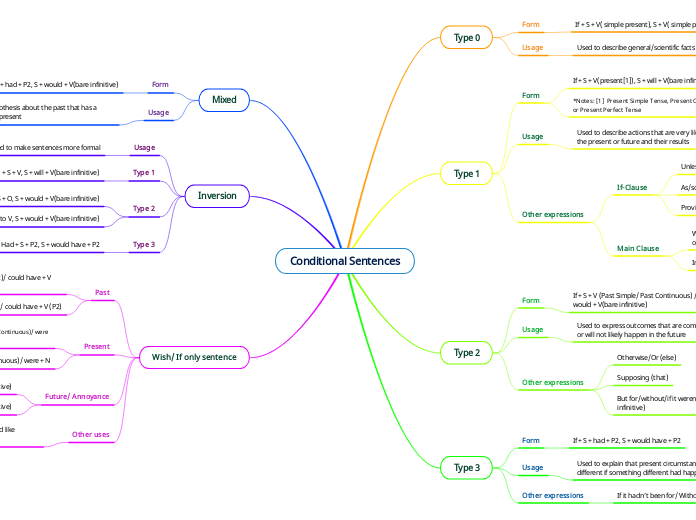
Form
If + S + V( simple present), S + V( simple present)
Usage
Used to describe general/scientific facts and definitions
Form
If + S + V(present[1]), S + will + V(bare infinitive)
*Notes: [1] Present Simple Tense, Present Continuous Tense or Present Perfect Tense
Usage
Used to describe actions that are very likely to happen in the present or future and their results
Other expressions
If-Clause
Unless (similar to if...not)
As/so long as
Provided/Providing (that)
Main Clause
We can use should/can/could/may/might/have to instead of will
Imperatives can be used to replace Main Clause
Form
If + S + V (Past Simple/ Past Continuous) /were + N, S + would + V(bare infinitive)
Usage
Used to express outcomes that are completely unrealistic or will not likely happen in the future
Other expressions
Otherwise/Or (else)
Supposing (that)
But for/without/if it weren't for + N, S+ would + V(bare infinitive)
Form
If + S + had + P2, S + would have + P2
Usage
Used to explain that present circumstances would be different if something different had happened in the past
Other expressions
If it hadn’t been for/ Without + N, S+ would have + P2
Form
If + S + had + P2, S + would + V(bare infinitive)
Usage
Used to make a hypothesis about the past that has a consequence in the present
Usage
Used to make sentences more formal
Type 1
Should + S + V, S + will + V(bare infinitive)
Type 2
Were + S + O, S + would + V(bare infinitive)
Were + S + to V, S + would + V(bare infinitive)
Type 3
Had + S + P2, S + would have + P2
Past
S + wish(es) (that) + S + V (Past Perfect)/ could have + V (P2)
If only+ S + V (Past Perfect)/ could have + V (P2)
Present
S + wish(es) (that) + S + V (Past Simple, Past Continuous)/ were + N
If only+ S + V (Past Simple, Past Continuous)/ were + N
Future/ Annoyance
S + wish(es) (that) + S + would + V (bare infinitive)
If only + S + would + V (bare infinitive)
Other uses
Wish (somebody) to V (bare infinitive) = Would like (somebody) to V (bare infinitive)